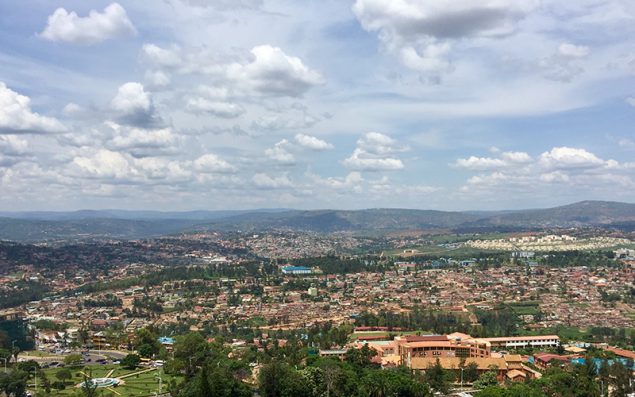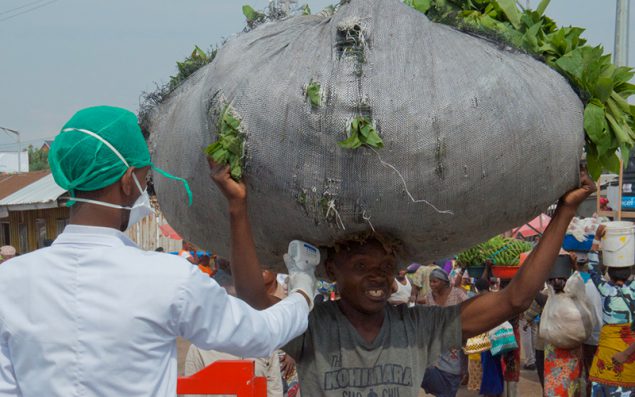Laying Down A Foundation for Preparedness
When the first case of Ebola was reported in Goma, Democratic Republic of Congo (DRC), on July 14, 2019, the neighboring country of Rwanda was on high alert. Goma, a major transit hub with approximately 2 million people, shares one of the busiest border crossings in the world with Rwanda. The Petite Barrière, one of the main border points linking Rwanda to Goma, sees approximately 60,000 people traveling on foot daily. With the high volume of people traveling across the Rwanda-DRC border, there is an increased risk of Ebola spreading. Responding to public health threats quickly and effectively is critical for preventing spread of any infectious disease. CDC is committed to supporting the Rwandan Ministry of Health (MOH) to strengthen its capacity to prevent, detect, and respond to public health threats such as Ebola.

Kigali, Rwanda (photo credit: Donda Hansen, CDC)

A man gets his temperature checked while crossing the Rwanda-DRC border. (photo credit: Victor Balaban, CDC)
CDC’s Footprint in Rwanda
CDC’s partnership with Rwanda began in 2002. HIV/AIDS was rapidly spreading throughout the country and took a devastating toll on its people. CDC established an office in the center of Rwanda’s capital, Kigali, and received funding from the U.S. President’s Emergency Plan for AIDS Relief (PEPFAR). With CDC’s support in helping prevent and control HIV/AIDS, Rwanda’s national HIV program is now being considered as one of the most successful in Africa. The CDC Rwanda country program expanded in scope to include support for Rwanda’s malaria and avian influenza activities as well as building laboratory and surveillance capacity for HIV/AIDS.
Preparing for Ebola
Since an outbreak of Ebola in eastern DRC was first confirmed by the MOH in August 2018, CDC started preparing to support DRC and surrounding countries to prevent, detect, and respond to this deadly disease. “Immediately CDC Director Dr. Robert Redfield contacted me and asked what we could do in Rwanda to help prepare in the event of a case,” said CDC Rwanda Director Gene MacDonald, Ph.D., MPH. Since then, CDC has sent more than 50 experts to provide technical assistance related to surveillance, vaccination, laboratory testing, case management, border health and infection prevention and control so that if there is a clinical case in Rwanda, they have the clinical expertise and mechanisms to contain the outbreak. Thanks to the support of CDC and global partners, capacity at the National Reference Lab in Kigali now exists for hemorrhagic fever viruses (such as Ebola and Marburg) and Rift Valley fever virus testing. Additionally, around 3,000 healthcare and frontline workers in areas at risk of Ebola spread have been vaccinated with the investigational rVSV-ZEBOV Ebola vaccine. While Rwanda has made significant progress in Ebola preparedness, the threat of Ebola remains as long as the outbreak continues in DRC.
“This is a terrible outbreak and it’s one of the most serious threats globally right now,” said Dr. MacDonald. “It is imperative that we stay on top of this, that we help the surrounding countries be as prepared as soon as possible to identify and respond to a case of Ebola.”